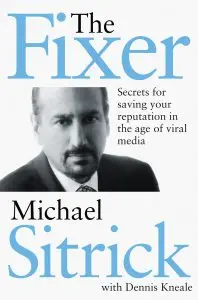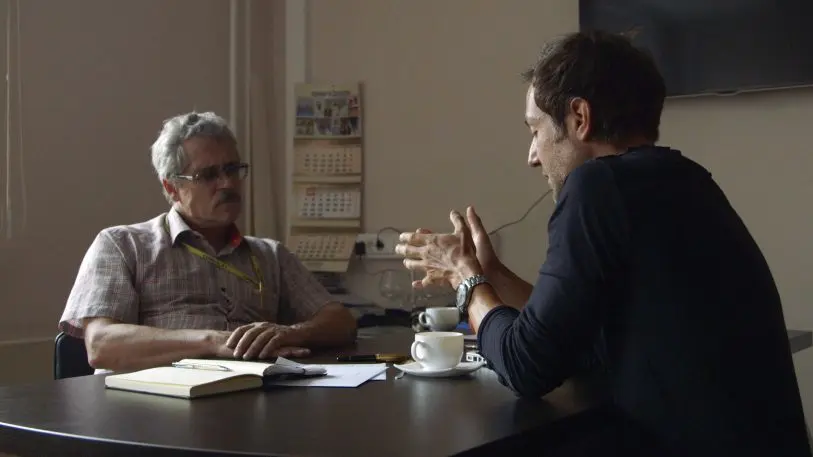“This is not a game for beginners or poseurs.” Michael Sitrick says matter-of-factly. “There are a lot of people who claim to know how to do what we do. My experience is there are very, very few who really know how to do it, and really do it, and really do it right.”
“It” is crisis public relations, which Sitrick has been doing for more than 30 years in and outside of Hollywood, salvaging reputations and entire companies through what some would call “spin,” but that he sees as a combination of artful strategy and an almost folksy simple belief in such basic tenets as telling the truth and getting the facts straight.
Those principles are two of Sitrick’s “Ten Rules for Engagement,” the formula for success he outlines in his new book, The Fixer: Secrets for Saving Your Reputation in the Age of Viral Media. Others include “Focus on the Fix” and “Put Your Opponent in the Wheel of Pain.”

Sitrick devotes a detailed chapter to each of his colorful tales, taking the reader through a journey of near-ruin to redemption, along the way pointing out chess moves that proved crucial in each meticulously meditated PR plan. Some tips may not feel all that revelatory (tell your story before someone else does), but some show how even the most minute details can’t be overlooked. For example, when Sitrick advised the Icarus filmmakers to give their findings to The New York Times so the paper of record could write an exposé on the Russian doping scandal before the film actually came out, he insisted that a reporter who spoke Russian interview Rodchenkov. Although Rodchenkov speaks fluent English, Sitrick feared that nuance would be lost if Rodchenkov was interviewed in English, which could lead to misunderstandings of the sensitive topics being discussed.

In keeping with Sitrick’s reputation as “The Winston Wolfe of Public Relations” (a reference to Harvey Keitel’s fixer character in Pulp Fiction), Sitrick doesn’t offer any major dish in his book. He clarifies that the only stories he tells have either been approved by his subjects or are already in the public domain. Still, The Fixer arrives at an apt time, particularly in the #MeToo era, when an avalanche of workplace harassment claims are sending titans from a variety of industries running for cover…and calling up people like Sitrick. His boutique firm, Sitrick and Company, in fact, represented Harvey Weinstein as part of Weinstein’s legal team in the aftermath of the sexual harassment and assault claims against him. Sitrick And Company recently dropped Weinstein as a client for reasons Sitrick will not reveal.
Of the current wave of sexual harassment and assault allegations, he says, “There are always cycles” within the media. “But I’ve never seen one quite like this.”
Sitrick recently spoke to Fast Company about #MeToo, The New York Times over BuzzFeed, and the importance of getting the facts straight.
1. Always Comment

“What you really want to do is get the facts before you open your mouth,” he says. “How many times have you seen a company that has a plant explosion or something that happens with wrongful termination, and they put out a statement and then other facts come out and they have to put out a correcting statement? So I always say to clients, ‘Look, if you don’t have the information, say, ‘Look, we’re doing an internal investigation. We don’t have all the facts. We don’t want to give you information and find out two days later or two weeks later that our investigation has turned up data that indicates what we gave you was wrong. So we want to tell you what we know now. We’re not sure what we know now. All we know is we’re investigating it. We’re investigating the allegations, we’re looking at all sides of it.’ If it’s serious enough, I recommend they bring in a third party or independent counsel or an independent company to do an investigation and then we can give [the media] an answer. But that’s very different than saying, ‘We’re not commenting.'”
2. Old Media Still Rules
Sitrick is equally dogged about finding a “lead steer,” or a major legacy news outlet, to break a story so that all the other news outlets will follow suit. He maintains that even in an age when young people get most of their information on Twitter or from upstarts like BuzzFeed and Vice, old-fashioned legacy media is still king.
“As a journalist, you’re taught, Who’s your audience?” he says. “Identify who your audience is. So it’s the same thing here. Who is your audience? Let’s use the simplest example. If the legacy media did not report on Donald Trump’s tweets, how much impact would his tweets have? Minimal, right? I don’t care how many followers he has. But what gives the tweets an added breadth, and I’d even say added credibility—I don’t know how much more credibility the President of the United States needs, but in some people’s minds that isn’t a lot—is that [the tweets] are reported. If CNN didn’t run them all day, and NBC and ABC and The Wall Street Journal and The New York Times and every other media outlet didn’t report on them, they wouldn’t have nearly the impact.
“Or you have a post on Facebook and it goes viral. Now let’s assume nobody else writes about it. What’s going to have more impact? A post on Facebook that goes viral on Facebook, or a post on Facebook that goes viral, The New York Times runs a front-page story on it, and every other media outlet in the world picks it up. What’s going to have more impact?”
3. Get The Facts Straight
The sexual harassment claims that have come out of the #MeToo movement vary in range from behavior that’s under criminal investigation (such as Weinstein’s) to grayer areas. Sitrick says that when dealing with any of the claims—and any claims period, regardless of the context—the first step is to get the facts.
“I had a client who’s a millennial. He’s actually the son of a famous Hollywood director. And I get a call from a well-known media organization, saying, ‘We’re doing a piece on his sexual harassment.’ I say, ‘Well, what’d he do? ‘You know, he was having sex with a woman in a bathroom, or he tried to have sex in the bathroom, and she rejected him.’ I called him up and said, ‘What’s the deal?’ He said, ‘Well, I’ve been dating her for a while. I was in the bathroom. I texted her and said, ‘Hey, you want to meet me in the bathroom?’ And she said no.’ And I said, ‘Well, what happened?’ He said, ‘I texted her back, ‘O.K. I’m coming back, we’ll finish dinner.’ And I said, ‘Then what happened?’ He said, ‘We finished dinner. I took her home and I went out with her a few more times.’ So I called the reporter and I said, ‘Have you seen the texts?’ ‘No.’ I said, ‘Well, we’ll send them to you off the record. Why don’t you ask her if this happened?’ So she asked her if this was what happened, and the woman said yes. I said, ‘Well, what’s your story? You know, if he was sitting in a bar and said to the woman next to him, ‘Hey, you want to hook up and go to my room, and she said no, is that a story?’ So that’s what I mean about getting to the point; about doing your homework.”
4. DON’T LET PARANOIA TURN #METOO INTO ANOTHER FORM OF DISCRIMINATION
Sitrick says that “even if a third of the reports” about sexual harassment in Hollywood are true, “It’s horrible. It’s not acceptable.” But he also fears that there are some cases where the corrective backlash is too extreme.
“There was a story in Vanity Fair that talks about the fact that there are now [male] executives and professionals who will no longer have closed-door meetings with women employees in their offices. And I think that’s awful. I read somewhere else that there were people saying, ‘Look, if there’s a man and a woman for a job, why would I take the risk of hiring a woman?’ Now, I’ve been around long enough that I remember when people would say that about hiring a person of color. Because you hire them and you can’t fire them, right? I’ve always thought that that was bullshit. But if all this results in additional discrimination, that’s a bad thing. If I couldn’t have a closed-door meeting with women, that’d be the majority of people in my firm. At least half my partners are women. And if my assistant or another assistant has a concern and wants to talk to me alone, maybe it’s about a medical problem, maybe it’s something personal, I don’t want to say, ‘I can’t meet you alone.’ It’s not the way I have ever been and it’s not the way I will run this show.”
Recognize your brand’s excellence by applying to this year’s Brands That Matter Awards before the early-rate deadline, May 3.
